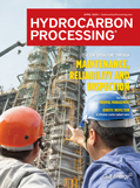Gas Processing/LNG
Liquefaction technology selection for baseload LNG plants
As global liquefied natural gas (LNG) trade continues to rapidly expand, the challenge of liquefaction process selection—a key element of an LNG project—becomes increasingly important.
Decline in LNG contract lengths and volumes raises future supply concerns
A dramatic acceleration of a trend toward smaller volumes and shorter tenures for LNG contracts in 2017 highlights the growing commoditization of the global LNG market, even as it raises troubling questions about future supply.
Develop competence in the process industry with a digitalized operator learning path
Industrial digitalization is changing the standards for operator training in the global process industry.
Industry Perspectives
Petrochemicals and gas processing/LNG sectors see largest increase in new projects.
Global Project Data
According to Hydrocarbon Processing’s Construction Boxscore Database, nearly 450 downstream projects are under construction around the world.
Digital: Maximize return on capital investment with predictive maintenance
Oil and gas professionals are well aware of the pressures companies face in the market.
Global Project Data
According to Hydrocarbon Processing’s Construction Boxscore Database, Asia, the Middle East and the US contain 66% of all active downstream construction projects globally.
Industry Perspectives
Over the past several years, new gas processing/LNG capacity has surged in nearly every region.
Optimize LNG production through contaminant mitigation—Part 2
The production of liquefied natural gas (LNG) requires a number of stages to effectively purify the feed gas. These stages are essential to maintain continuous operation and to meet product specifications. Liquid and solid contamination issues are common in many feed gas purification operations and can cause severe problems with equipment fouling, leading to additional expenses in maintenance and equipment repair, reduced production capacity and even unscheduled shutdowns.
The future of LNG—Part 2
Over the past several years, new gas processing/LNG capacity has surged in nearly every region. Growth on both the supply and demand sides has resulted in the announcement of billions of dollars of capital investment around the world. Millions of tons of new LNG import and export capacity have begun operations, with hundreds of millions of tons still under development.

- Iran's Persian Gulf Mehr refinery scheduled for completion in early 2025 5/13
- Iran announces 15 petrochemical projects to expand domestic production to nearly 80 MMtpy 5/13
- Russia gained newer diesel trade partners in 2023 5/13
- NOVA Chemicals launches Canadian Center of Excellence for Plastics Circularity 5/13
- Iran to boost gasoline, diesel production as new units go online 5/13
- U.S. renewable diesel glut hits refiners' margins 5/13




